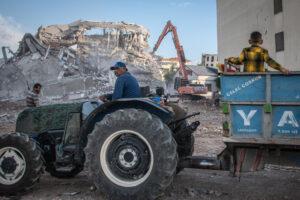The ethical quagmire of child labour
Clothing giant Gap has become embroiled in another child labour scandal in India. But is the answer to ban poor children from working?
An Observer investigation has found that an Indian supplier used by Gap has been employing children in conditions “close to slavery” in sweatshops in the backstreets of New Delhi.
The irony that these bonded child labourers should be working in such horrific conditions on clothes destined for our Christmas shopping baskets to give the kind of seasonal cheer to western consumers that these kids are never likely to experience should give us all pause for thought.
This latest episode highlights starkly some of the most painful dilemmas of the global economy. Should corporations be allowed to make windfall profits by manufacturing in poor countries and selling in rich ones? Would ending such corporate profiteering improve or worsen the plight of workers in developing countries?
Gap has promised to withdraw tens of thousands of items identified in the investigation and to stop using the culpable contractors. Its ethical policy states its commitment to ensuring that its clothes are free of child labour and that, if it discovers children being used by a contractor to make its clothes, that contractor must remove the child from the workplace, provide him or her with access to schooling and a wage, and guarantee the opportunity of work on reaching a legal working age.
This ethical commitment and the refusal of millions of western consumers to purchase such tainted products is, at one level, admirable. But this conscientious objection will not make the issue of child labour disappear.
I long to see the day when the lives of all children are little more than child's play, disturbed by nothing more than the occasional grazed knee in the playground or a spelling bee buzzing in their heads. But the reality is far removed from this idyllic ideal.
According to the UN, a fifth of India's GDP is produced by 55 million children. And, as anyone who has lived or travelled in developing countries will readily attest, the situation is similar across the globe. There are more than 200 million child labourers worldwide, excluding domestic labour, UNICEF estimates.
The trouble with Gap's promise not to use child labour is that it immediately raises the question: what would these poor Indian children be doing if they weren't making clothes? Well, in New Delhi, they are likely to wind up hawking on the streets, begging or perhaps worse.
According to available statistics, the vast majority of working children do backbreaking farm work and more than half are engaged in hazardous or dangerous activities, such as working in mines. In addition, an estimated 1.2 million children are trafficked, forced into debt bondage or other forms of slavery (5.7 million), or into prostitution and pornography (1.8 million).
In societies lacking a social safety net, orphans, children from very large families or with sick parents have to find a way to make a living to support themselves and/or their families. In fact, hard as it may be for us to stomach in the affluent West, millions of children would view making clothes, under the right conditions, as a relatively attractive prospect.
If Gap and other large clothes chains are going to continue to manufacture in the developing world, rather than refusing to use child labour and turning a blind eye to contractors who do, I propose that they should develop an ethical child labour policy.
Gap and other clothes manufacturers should stop using small subcontractors because they are difficult to control. Instead, they should open up their own fully owned production facilities so that they cannot pretend ignorance when abuses are committed.
These corporations should sign up to an ethical code of conduct to regulate and limit child labour. The code would stipulate that children should not be employed in physically taxing work, such as heavy lifting, should work fewer hours than adults, and receive pay commensurate with the work they are doing and not be seen as a cheap alternative to adult labour.
In addition, corporations should open up clinics and classrooms (or pay for the children to get some basic schooling) to ensure that the children they employ are in good health and develop literacy and numeracy skills that could help them to break out of the cycle of poverty when they get older. Job training and apprenticeship schemes would also help.
More ambitiously, western governments could start making global corporations with labour-intensive production facilities in poor countries pay an extra surcharge which would go directly into a fund to finance grassroots development projects and micro-credit initiatives. An independent global certification scheme could also be established to ensure that minimum baseline labour standards are met for goods destined for western markets.
The idea of condoning child labour is shocking to our rich-world sensitivities. But regulated child labour that affords children the long-term prospect of climbing out of poverty is a better alternative to the situation millions of children currently find themselves in.
We mustn't forget that it took many long years of prosperity, rising educational standards, wealth redistribution, fearless campaigning and legislation before Oliver Twist and David Copperfield became ghosts of an unappealing past.
_________
This article first appeared in The Guardian on 29 October 2007


